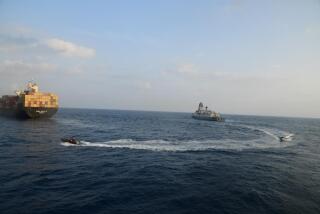Navy Thefts Spark Fear for National Security : Ease of Access to Inventory by Iranian Agents Calls Attention to Problems Plaguing System
- Share via
WASHINGTON — The ease with which agents for Iran allegedly gained access to the Navy’s $36-billion weapons and equipment inventory triggered expressions of concern Tuesday over whether national security was endangered by the military’s massive--but apparently thinly policed--computerized supply system.
“It sounds like they were ordering out of a Sears & Roebuck catalogue,” one government investigator said.
International Ring
On Monday, authorities in San Diego announced that they had cracked an international ring that tapped into the Navy supply system to illegally obtain parts critically needed for the beleaguered Iranian air force’s F-14 Tomahawk fighters.
The case is the first known instance in which agents for a foreign government are said to have obtained direct access to the nation’s military supply system--an inventory of more than 4 million items ranging from ordinary nuts and bolts to secret, sophisticated weapons and missile systems. And in the wake of the arrests, experts inside and outside government recited a litany of problems known to plague the system:
--Almost any item in the military inventory can be ordered by anyone at a military installation with access to the supply system’s computers simply by entering a “national stock number,” according to one government analyst who has studied the Navy’s operations. Supply officers’ approval is supposedly required before delivery, but “it’s easy to beat the system,” this source said.
--Navy officials acknowledge that no independent check is made on the legitimacy of orders received by supply centers, saying that because of the priority given to a high level of readiness aboard aircraft carriers and at other facilities, “maximum responsiveness to orders” is demanded of the supply system.
--An “old, overtaxed, patched-up computer system” lacks the capability of keeping track of parts, resulting in duplication and overprocurement at depots nationwide, a congressional investigation found two years ago.
--The Navy had not conducted a “wall-to-wall inventory” at its supply depots and other facilities in more than 20 years, the same investigation found, and more than $300 million in parts and equipment could not be accounted for.
--Inventory controls have been described as woefully inadequate, in part because of poor training of personnel. Congressional investigators discovered, for instance, than 21 inventory control workers at a Norfolk, Va., naval depot “could neither read nor write,” said Williston B. Cofer Jr., an aide to the House Armed Services Committee.
‘I’m Shocked’
According to authorities in San Diego, the smuggling ring included at least half a dozen individuals, among them a sailor identified as an aviation storekeeper on the San Diego-based aircraft carrier Kitty Hawk, a civilian warehouse worker at the Navy’s Fleet Avionics Logistics Support Center in San Diego and an Iranian national arrested in London who allegedly paid millions of dollars for items on his “shopping list.”
While other recent procurement scandals have centered on the waste of taxpayers’ money, the revelations in San Diego on Monday shifted the focus to national security.
“I’m shocked,” declared Geoffrey Kemp, a senior fellow at the Georgetown Center for Strategic and International Studies who was a National Security Council specialist on the Middle East during the Carter and Reagan administrations.
The United States supplied about 80 F-14s to Iran in the 1970s but banned shipment of spare parts after Ayatollah Ruhollah Khomeini came to power six years ago. No other nation has the sophisticated fighter and until this week “there never had been any suggestion there was a leak of F-14 spare parts,” Kemp said. “We thought we had controlled the spigot.”
Shock and dismay also were voiced by John Buchanan, a retired Marine pilot and supply officer who is a senior research analyst at the Center for Defense Information, a private Washington-based military study group.
“It is absolutely incredible they were able to carry this off,” Buchanan said. “You are talking about $50,000 gyros. How could they get them on a consistent basis without someone noticing?”
Buchanan said he doubted that smuggling of F-14 parts would have directly aided the Soviet Union. “If the Iranians wanted to give the Soviets anything off the F-14, they would have done it by now,” he said.
But, responding to questions about the apparent penetration of the U.S. military supply system, he said, “If it could be done for the F-14, I guess it could be done for the B-1,” the nation’s newest nuclear bomber.
Buchanan predicted that “a lot of heads will roll,” but Pentagon officials were cautious in discussing ramifications of the scandal. A spokesman for Secretary of Defense Caspar W. Weinberger said “he was kept abreast of the investigation” but declined further comment.
One high-ranking Navy officer, who asked not to be identified, said: “You can’t legislate or regulate greed. . . . We’re vulnerable to a crook because everybody’s assuming everybody else is honest.”
While investigators have declined to publicly discuss in detail how the smuggling ring manipulated the supply system, sources said it involved placing orders for items ranging from air attack computers and radar system parts to washers and rings, pretending the equipment was intended for F-14s based on carriers like the Kitty Hawk.
The Iranians had access to the supply system’s stock numbers because parts manuals for F-14s had been delivered to the government of Shah Mohammed Reza Pahlavi when the Nixon Administration supplied the fleet of fighters.
“Once the order is in the computer system, it’s almost automatic,” one government source said. “The computer tracks down where the parts are stored and sends out shipping instructions.”
More to Read
Sign up for Essential California
The most important California stories and recommendations in your inbox every morning.
You may occasionally receive promotional content from the Los Angeles Times.













